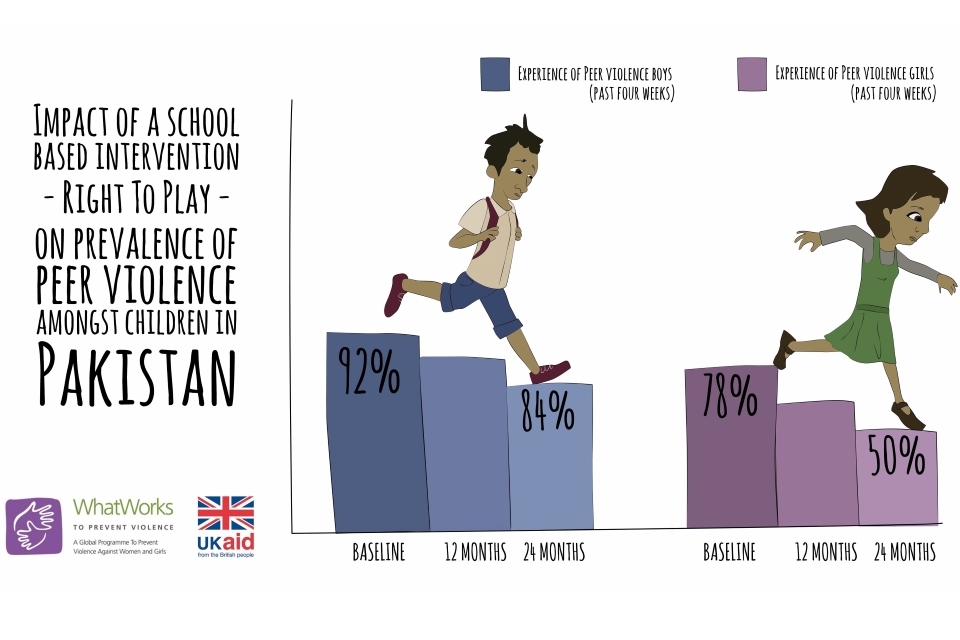Ending violence against children
Updated 19 February 2024
Violence is a daily reality for far too many children, with a third of children experiencing physical violence and a quarter of children experiencing psychological violence worldwide. Girls are at a higher risk of some forms of violence than boys, especially during adolescence when they are at a higher risk of sexual violence. All violence, perpetrated in and out of school, is not only a human rights abuse – it can also be a significant barrier to education. Violence can lead to low school attendance, high dropout rates, and difficulty learning. Children cannot learn when they are scared.
UK research has shown that violence is preventable. The What Works to Prevent Violence programme works in 13 countries and is building evidence on how to prevent violence in lower-middle income settings. In Pakistan, the programme’s ‘Right to Play’ project used sports and play to encourage children to reflect on gender and violence, and to build skills including communication and empathy. Through this project, rates of peer-to-peer violence decreased dramatically in just 2 years.

Shows how peer violence experienced by boys and girls was reduced over 24 months, as part of the ‘Right to Play’ programme in Pakistan. Boys’ experience of peer violence was reduced from a baseline of 92% to 84% 24 months later. Girls’ experience of peer violence was reduced from a baseline of 78% to 50% 24 months later.
Case study: The Good School Toolkit in Uganda [footnote 1]
UK-funded research [footnote 2] has identified effective school-based interventions to reduce violence. The Good School Toolkit aims to address corporal punishment through changing schools’ institutional culture. It has 6 steps, which include developing an action plan following initial information gathering with the school community (including teachers, parents and children), and activity guides. There are 3 main objectives:
-
to equip teachers to increase pupils’ confidence
-
to create a safe, respectful learning environment
-
to support the school administration in becoming more transparent and accountable
Two lead teacher ‘protagonists’, and 2 pupil representatives per school coordinate activities, with support visits and phone calls from Raising Voices staff. Some activities involve outreach to parents and the surrounding community.
Over 18 months, violence by teachers at Toolkit schools reduced by 41%. The Toolkit was highly effective for both sexes, but the effects were more marked for boys. In engaging the whole school community, it improved teacher-pupil relations, and children’s sense of well-being and belonging in school.
In India, UK research contributed to a law change which meant that, even in wedlock, sex with an underage partner was categorised correctly as an offence of rape [footnote 3]. Similarly, after UK evidence was shown, legislative change on age for marriage is happening in both India and Peru [footnote 4]. However, our research suggests that changes in the law are only the first step and that a broad approach to ending child marriage is needed. This includes addressing discriminatory social norms, engaging with men and boys, investing in quality education and ensuring access to decent work for young women.
Child marriage also increases a girl’s risk of dropping out of school, early pregnancy, and gender-based violence. Every 3 seconds, somewhere in the world, a girl becomes a child bride. Based on current estimates from UNICEF, it will take another 300 years to eliminate child marriage. There is therefore an urgent need to act to end child marriage as soon as possible.
Case study: Arti and Sisters for Sisters programme in Nepal
Arti is 15-years-old from Nepal. Arti is part of Sisters for Sisters, a UK-funded mentoring and support programme. ‘Big Sisters’ (local women with training in life skills and education) encourage ‘Little Sisters’ (local girls) to go to school, and get the education they need to unlock their potential. Arti is one of over 9,000 girls supported to learn and thrive through the Sisters for Sisters programme.[footnote 5]
My name is Arti and I’m 15 years old and I’m a Little Sister.
My parents tried to force me to get married, and I got engaged at age 14. All the decisions for a young girl to get married are taken by the parents and other relatives.
I came home from school one day, and my mother told me people were coming to arrange a marriage. I started crying and asked, ‘Why are you arranging my marriage now, when I’m so young?”. She said: “It wasn’t just me, my sisters would also have to get married.
I didn’t want to get married, but people in the community said that, because I’m from a poor family and I’ve got lots of sisters, it would be helpful for me to get married. So I finally said yes.
But my marriage was interrupted by my Big Sister, Anu. She came with the other Big Sisters to talk to my parents.
When Anu stopped my parents from marrying me, I was so happy. I think if all the girls here were to go to school, they would learn more things, and with that education they could play a better role in looking after their family.
Now I love to study. I want to have the chance to study further and become a teacher.
-
The Good School Toolkit for reducing physical violence from school staff to primary school students: a cluster-randomised controlled trial in Uganda (thelancet.com) ↩
-
Through the Joint Global Health Trials – UKRI (MRC) Programme ↩
-
Child Marriage Impact Case Study Young Lives India (younglives-india.org) ↩
-
Two Years of COVID-19 Threatening Progress Towards the Sustainable Development Goals (younglives.org.uk); The Indigenous leaders fighting early marriage in Peru - La Prensa Latina Media ↩
